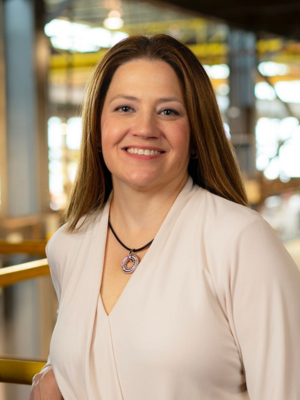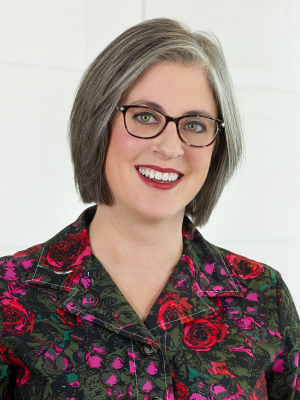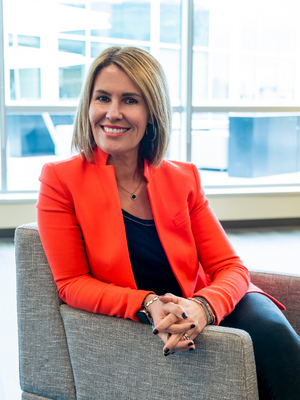 “If you are looking for career growth, whether that’s moving up the chain of command, or whether it’s broadening your skill set, you must trust in yourself and take on things you’ve never done before,” says Kendra Lee.
“If you are looking for career growth, whether that’s moving up the chain of command, or whether it’s broadening your skill set, you must trust in yourself and take on things you’ve never done before,” says Kendra Lee.
Lee shares how her willingness to take risks, embrace new opportunities, and have the confidence of her convictions not only shaped her career trajectory, but continues to guide her as a leader.
From Lab Tech to CEO
Upon graduating from Texas A&M with a marine sciences degree, Lee never anticipated a career in the chemicals industry. Typically, her field required pursuing a graduate degree, but she was eager to start working and wanted a break from school. Merichem, a family company founded by her grandfather in 1945, offered her an unexpected opportunity – a lab technician role.
However, she quickly realized that lab work was not her passion, and when an internal sales position opened, she seized the chance to explore a different path that better aligned with her interests. Concurrently, she decided to earn an MBA to build a stronger business foundation. As she was completing her MBA, her grandfather passed away, and Merichem’s leadership transitioned to her cousin. Lee credits her cousin with recognizing her strengths and guiding her from sales to finance, hinting at her potential for future leadership.
“I recognized later that by encouraging me to get experience in corporate finance, he was preparing me with the skills and knowledge needed to one day assume leadership of the company.”
Lee’s readiness to embrace new challenges and build her skill set eventually led to her becoming Chairman and CEO in 2013. In leading Merichem, Lee is thrilled to continue the legacy of sustainability that is at the core of what the company does.
“From as early as 1945 Merichem has been focused on taking products that would otherwise be classified as hazardous waste and cleaning them up or reusing them to make them better for the overall environment, fitting a need for the industry.”
Leading Change for Business Growth
Lee’s entrepreneurial spirit shines through as she fearlessly leads change at the company, knowing it’s essential for business growth and adapting to industry needs.
“It’s about having the right leadership team to drive change, addressing operational issues for greater efficiency, and implementing necessary adjustments despite initial resistance. Ultimately, people realize these changes are beneficial. I see myself as a change agent who enjoys looking for ways to improve and then executing those processes.”
Lee recognizes that change can come with uncertainty, but she is energized by navigating the unknown to get to an outcome that is better for the business. For example, Lee recently led the divestiture of a part of the business that removed sulfur compounds from liquids to help provide cleaner fuel sources in the petrochemical industry.
She explains, “part of the reason we divested was because we recognized the business’ growth potential and importance, but Merichem was not the right owner. It needed new ownership to be able to grow and take advantage of its place as one of the leaders in removing sulfur within the oil and gas space.”
Taking Risks and Trusting in Yourself
Lee’s willingness to take risks and embrace new opportunities served her well in progressing from lab tech to CEO and clearly continues to drive her as a leader.
She advocates, “you have to take that risk. Be willing to trust in yourself and know that you can figure it out. Because otherwise you become paralyzed, and you won’t take that next step.”
Taking the leap to try something new also creates momentum in building the skills to get to the next level.
“You’re never going to get more experience or broaden your skill set if you don’t say, ‘I’ve got to do this. I’ve proven to myself I can learn things, so let’s try it.’ It’s trusting in yourself.”
Lee notes that trusting in herself also builds confidence, an important element of leadership development.
“I have a strong self-confidence that comes across, even though I’m not inclined to self-promotion. My confidence helps in addressing difficult subjects head-on with clarity, admitting when I don’t know something, which adds value and credibility.”
As a woman leader in the male-dominated industry of oil and gas, Lee shares that it took time and experience for her to build that confidence when walking into spaces where she was one of the only women. She adds, “as I’ve gotten older, I’ve come to acknowledge my strengths and talents, and can say, ‘it doesn’t matter that I’m a woman, I have just as much to contribute to the conversation as a man does’.”
Being a Leader who Listens
Lee is a collaborative leader who listens to her team and makes a point of cultivating an environment where they feel safe to give honest feedback. She finds that it is essential to have that space for dialogue to get the best ideas out there to make an informed decision.
“One thing I learned very early on is that I’m not the smartest person in the room. And while the decision may be mine to take, there is a lot of other valuable input that I need to hear and consider before I decide. In the end it will help me make a better decision.”
Creating a culture that allows for constructive feedback and even disagreement is important to Lee. Beyond being an active listener, Lee takes the perspective that “opinions are never wrong as it’s all shaped by how we see the world and where we were raised…it’s acknowledging that there is validity to what people are saying, even if it may not be the right answer at the right time.”
Lee also looks for a diversity of opinion and is intentional in creating a team that reflects many viewpoints.
“The more diversity you can get in that thought group, whether it’s gender, race, or ethnicity. the better your decisions because everybody comes at it a little bit differently.”
Passionate about Community and Family
Outside of work, Lee is deeply committed to her community. She serves on the board of Kids Meals, a non-profit organization that provides daily free lunches to children under five who experience food insecurity, as they are not yet part of the school system.
“Currently, they’re serving about 8,000 children a day. It’s remarkable the impact they can have on the community, helping to set these kids up for success when they do get to school,” she notes.
In addition to her community involvement, Lee manages a busy schedule with her active teenagers. She is grateful for the support of nearby family members who assist in getting her children to their activities when she or her husband are in meetings or traveling. Despite her demanding role as a company executive, she reflects, “It’s the same amount of stress as any working parent faces. Having a C-suite title does not make it any more difficult.”
To unwind, Lee enjoys vacationing with her family, cooking, and gardening.
By Jessica Robaire




